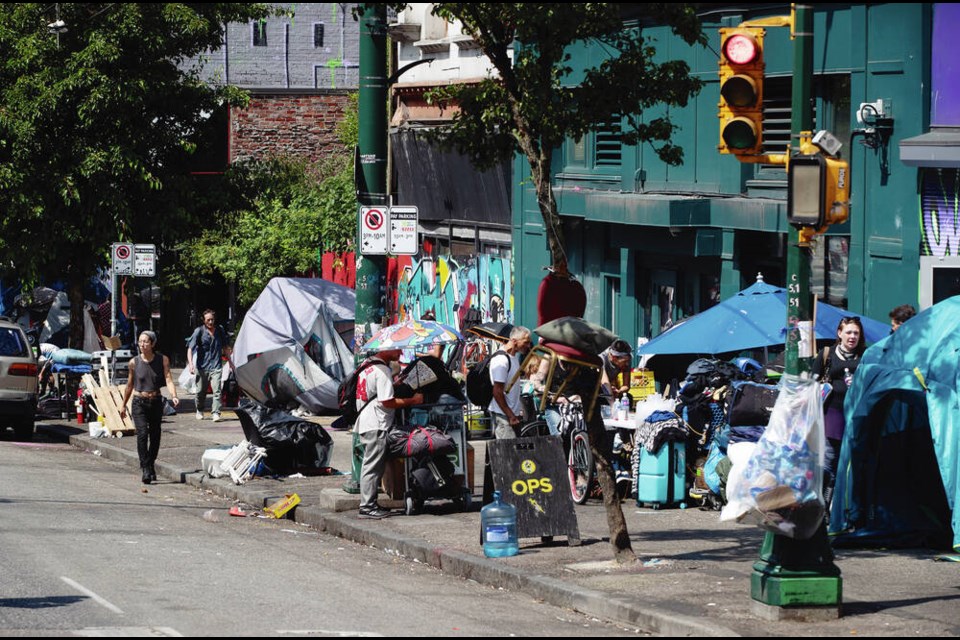VANCOUVER — A resident of a street encampment in Vancouver’s Downtown Eastside watched Tuesday as workers began removing some people’s belongings after the city handed out notices advising that tents and other structures will be dismantled.
The woman, who didn’t want to be identified because of personal security concerns, said she was unsure whether to stay or leave, even as she organized her belongings outside her tent.
There was a heavy police presence as city staff set to work, handing out bags and lining up garbage bins beside several tarp-covered structures in front of an abandoned building.
But other residents of dozens of tents lining several blocks along East Hastings Street were staying put.
The encampment resident said occupants haven’t been offered any housing options as part of the process.
“It’s really tough because, like, I don’t know what to do. I don’t know if I should stand my ground and not move or if I should, you know, just give up and go,” the woman said through tears.
“I actually do have a home, but my living conditions are so horrendous that I can’t even go there,” she said.
Vancouver fire Chief Karen Fry issued an order last month requiring the tents be cleared, saying they posed an extreme fire safety hazard, and a statement from the city on Tuesday said the removal process is expected to continue for weeks.
The woman’s tent was set up near the Overdose Prevention Society where she works, opposite to where cleanup staff were focusing their efforts on what the city has deemed the “highest risk” areas.
She said she agrees the city needs to address concerns, including the risk of fire in certain areas, but she and her neighbours keep their side of the street clean.
“Across the street, it’s gotten absolutely out of hand,” the woman said.
“Baby on the block!” she shouted, as a passerby pushed a stroller by her tent. She explained that residents put the word out whenever children are around in order to ensure their safety.
Vince Tao, who works with the Vancouver Area Network of Drug Users, said clearing the tents violates a memorandum of understanding between the city, the B.C. government and Vancouver’s park board signed in March last year after previous encampments were cleared.
The agreement is aimed at connecting unsheltered people to housing while preserving their dignity.
It commits the province to respond to encampments by providing outreach through BC Housing, the Crown corporation responsible for managing subsidized housing. It also commits the city to working with provincial, federal and community partners to connect residents with housing options.
The agreement said the city may enforce its bylaws that prohibit structures on sidewalks “when suitable spaces are available for people to move indoors.”
The city isn’t following that protocol with the cleanup now underway, Tao said in an interview as police vehicles blocked traffic access to the street.
“Even if they’re successful in doing this, people still have nowhere to go. So, they’re either going to come right back, or they’re going to be a block down,” he said.
City parks have been closed off to so-called “tent cities” as well, he added.
It’s an “endless cycle” until people have access to affordable housing, Tao said.
The woman whose tent was pitched near the Overdose Prevention Society said she pays to rent a room indoors but doesn’t feel safe or comfortable there. A friend sitting nearby said the space was “infested” with insects.
The city has offered to store people’s personal belongings, but the woman said items have been stolen or gone missing in similar situations in the past.
A statement from the advocacy group Pivot Legal Society said the city created the deteriorating conditions in the encampment along Hastings Street by failing to provide promised storage, hygiene facilities and garbage disposal, and it’s now citing those same safety and health concerns as the reasons for the forced removal.
Pivot called on Vancouver to provide “livable, dignified, and accessible housing,” and for the fire department to acknowledge the needs of encampment residents by creating a harm reduction approach to fire safety that accounts for challenges ranging from toxic drugs to police violence and trauma due to colonization.
This report by The Canadian Press was first published Aug. 9, 2022.



